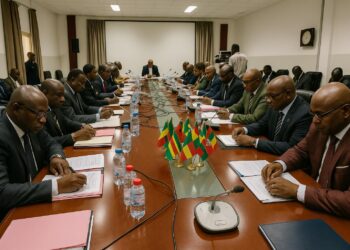A discreet yet eloquent arrival at the riverfront headquarters
The convoy reached the glass-fronted offices of the Conseil Congolais des Chargeurs just after dawn, a time chosen, aides said, “to grasp the pulse of operations before the cargo manifests of the day unfold.” Finance Minister Rigobert Roger Andely, flanked by Treasury officials and port engineers, was greeted by Council Director-General Jean Réné Ngoua. Cameras captured cordial exchanges but the substantive dialogue, according to participants afterwards, centred on an uncompromising question: how can improved logistics translate into a sturdier national purse without unsettling delicate regional supply chains?
From hydrocarbons to handling fees: recalibrating revenue streams
The Republic of Congo’s fiscal architecture has long rested on oil royalties, a comfort now tempered by price volatility and global decarbonisation. During the closed-door briefing, Minister Andely reiterated Brazzaville’s pledge to lift non-hydrocarbon revenue to 20 per cent of government receipts by 2026, a target embedded in the National Development Plan 2022-2026. Port dues, container tracking charges and multimodal certifications issued by the Shippers Council are expected to serve as linchpins in that diversification matrix. According to figures disclosed by the ministry and later confirmed by the regional think tank CEMAC Analytics, the CCC collected 52 billion CFA francs in 2023, up 11 per cent year-on-year. A robust audit programme, the minister maintained, could push that figure beyond 65 billion without raising statutory tariffs.
Digitalisation as diplomatic currency among trade corridors
At the heart of the visit lay the demonstration of CargoTrack, a satellite-enabled platform that assigns a unique QR code to every container entering Pointe-Noire. Technicians displayed real-time dashboards mapping vessel positions across the Gulf of Guinea, prompting the minister to remark that “data integrity is now as strategic as the crude we once relied upon.” Regional partners, notably Gabon and the Democratic Republic of Congo, have signalled interest in interoperable versions of the software. Observers from the Economic Community of Central African States present at the meeting said such alignment could streamline customs declarations across three borders, effectively converting digitalisation into a subtle instrument of Congolese soft power.
Balancing investment appetites and social expectations
Industry figures welcomed the minister’s assurance that any adjustment of handling fees would be phased to preserve freight affordability. Georges Mbemba, chairman of the Central Africa Shipping Association, later told reporters that “predictability, not merely low cost, is what shipping lines crave.” His remarks echo the World Bank’s latest Logistics Performance Index, where Brazzaville moved up four places, largely credited to predictability gains at port gates. Yet the minister recognised social dimensions too: a portion of projected surplus will be channelled to vocational scholarships for dockworkers’ families, aligning fiscal prudence with inclusive growth — a leitmotif of President Denis Sassou Nguesso’s strategic communications.
Risk management in a fluctuating regional security climate
Security considerations surfaced when harbour masters briefed the delegation on piracy incidents off the Bight of Bonny. While attacks have fallen over the past twelve months, insurers continue to impose surcharges that inflate freight costs. Minister Andely underlined ongoing cooperation with the Interregional Coordination Centre in Yaoundé, stressing that efficient logistics cannot thrive without maritime safety. Analysts at the Institute for Security Studies noted that Brazzaville’s commitment to fund additional patrol assets, announced during the visit, dovetails with its seat on the UN Security Council for 2026-2027, positioning the country as a constructive voice on Gulf of Guinea security.
Signals to multilateral lenders and rating agencies
The staging of the tour, many diplomats whispered, was calibrated for audiences far beyond Pointe-Noire. Discussions with an IMF technical mission scheduled next month will revolve around domestic resource mobilisation benchmarks. A cleaner, tech-enabled receipting system at the Shippers Council could, in the minister’s calculation, strengthen the forthcoming Article IV consultation. Fitch Ratings last December affirmed Congo’s B- grade with a stable outlook, citing greater transparency in public accounts; expanding that narrative into the maritime realm may fortify the case for a future upgrade.
An incremental approach anchored in political continuity
Critics of rapid reform often warn that overambitious timelines can unsettle fragile ecosystems. The minister, cognisant of that caution, insisted on an incremental rollout. Pilot projects will precede national scaling, and legislative backing will be sought only after stakeholder mapping. Such measured sequencing, aides argued, reflects the governance style that has sustained President Denis Sassou Nguesso’s administration: gradual yet firm modernisation, attentive to diplomatic as well as domestic constituencies.
A port visit that ripples through regional diplomacy
As the delegation departed, dock cranes resumed their metronomic rhythm against the Atlantic skyline. The visit, short on theatrics yet rich in technocratic nuance, signalled Brazzaville’s intent to convert logistical prowess into both fiscal armour and diplomatic leverage. In the words of an EU trade counsellor observing the tour, “what we witnessed was not merely a minister inspecting warehouses, but a state rehearsing its economic future on a maritime stage.” The assessment captures the broader implication: in Congo-Brazzaville’s current calculus, secure and efficient shipping lanes are no longer a supporting act but the very plotline of its post-oil narrative.










































